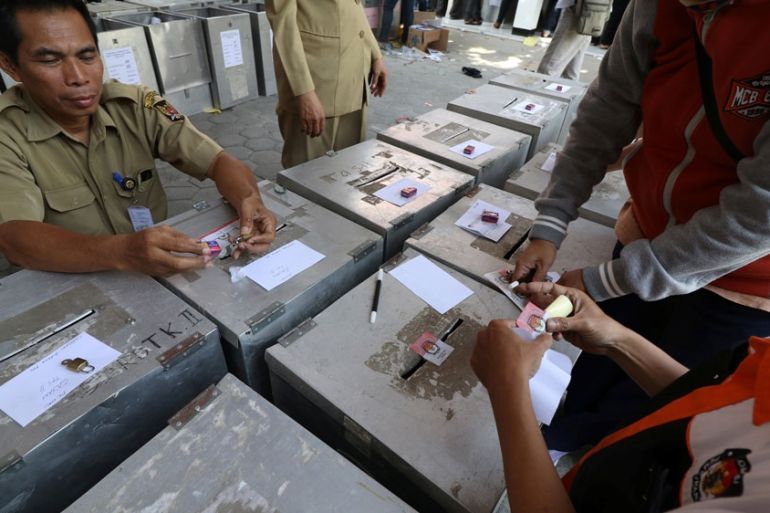Indonesia election season kicks off with crucial local polls
More than 150 million Indonesians will head to the polls on June 27 to elect 17 governors, 39 mayors and 115 regents.

Bekasi, Indonesia – Soldiers are guarding a half-built Catholic Church in Bekasi, near Indonesia’s capital, Jakarta.
The church has become a symbol of the election campaign of Rahmat Effendi, the mayor of Bekasi, a city of 2.7 million people, two million of whom are Muslim.
Keep reading
list of 4 itemsIndonesian voters go to the polls to choose a successor to Joko Widodo
‘Disappointed’: Indonesians reflect on legacy of departing Joko Widodo
Voters mull party or family as Indonesian president’s son runs for office
Despite strong local opposition against the building of the church, the Muslim mayor went ahead and issued a permit for it.
His decision came after church leaders lobbied his predecessors for 17 years without a result, forcing them to hold services in private homes.
“We have 340,000 non-Muslims in Bekasi, they need houses of worship. This does not mean they want to spread their religion. They simply want to pray,” the mayor said.
Effendi is one of the candidates in Indonesia’s regional elections on Wednesday.
Overall, more than 150 million Indonesians will head to the polls to elect 17 governors, 39 mayors and 115 regents, in what is seen as a major exercise in democracy in advance of next year’s presidential polls and a test for President Joko Widodo‘s chances to be re-elected.
After the election loss and jailing of Jakarta’s Christian Governor-elect Basuki “Ahok” Tjahaya Purnama in 2017, who was found guilty of blasphemy against Islam, there were concerns that religious and ethnic sentiments would dominate the polls.
But in Bekasi, a city tainted by religious violence for nearly a decade, the situation has remained quiet.
“There were rumours and fake stories spreading from mosque to mosque that I would build 500 churches and that a crusade was about to happen,” said Effendi. “But we have acted quickly together with police to arrest those responsible for spreading lies.”
Latifah, who sells household goods at a market near the guarded church, said she has Christian friends but added that the mayor should have “listened to the majority, who is Muslim”.
“Why did they need to build it so close to the homes of Muslim clerics,” she said, adding that even though the mayor did some good for the city she will not vote for him.
‘If people are happy, religious sentiments don’t play a role’
Still, Effendi is leading in the polls because of his free healthcare and education policies.
These policies have also boosted Widodo’s popularity, who enjoys approval ratings of around 70 percent.
The president’s candidates seem to be heading for victory even in provinces where his main rival, former General Prabowo Subianto, won in the 2014 elections – like in West Java, the province which Bekasi is a part of.
“If all is well and people are happy, religious sentiments don’t play a role,” said pollster Djayadi Hanan. “But if people start to feel the impact of a slowing economy, these are the first issues to pop up.”
This means that despite his popularity, Widodo is not unbeatable. Hanan predicts that if prices continue to be high and people keep finding hard to get jobs, Widodo might face a tough and nasty campaign.
“The economy has not improved as he promised and if a political scandal comes up, all the issues are thrown at him: that he is a communist, a non-Muslim, secretly a Singaporean and Chinese, will be used during the campaign.
“These identity politics have become more important now, not only in Indonesia but worldwide.”
Widodo and Subianto will be watching Wednesday’s “festival of democracy” very carefully before deciding on their next moves.